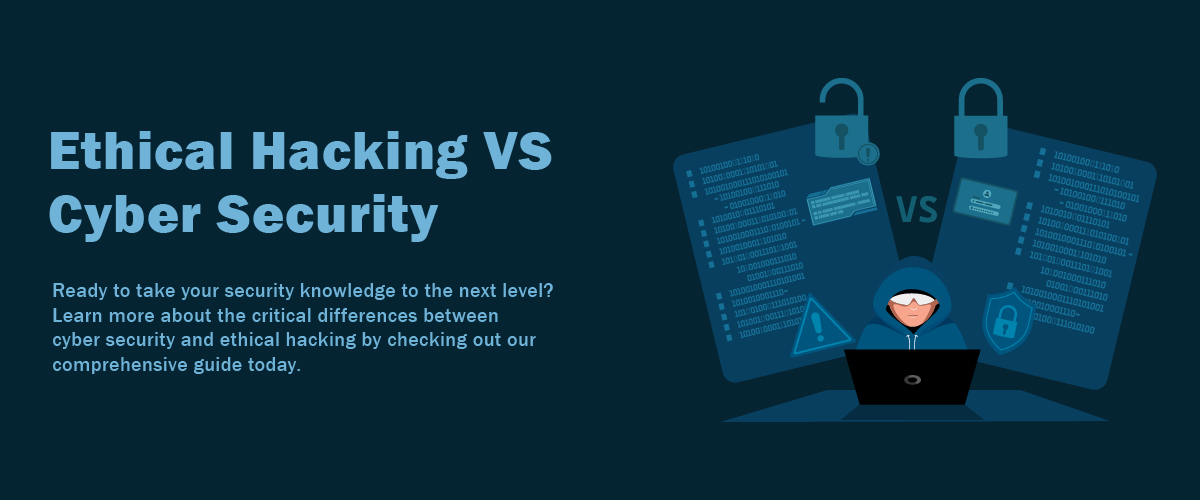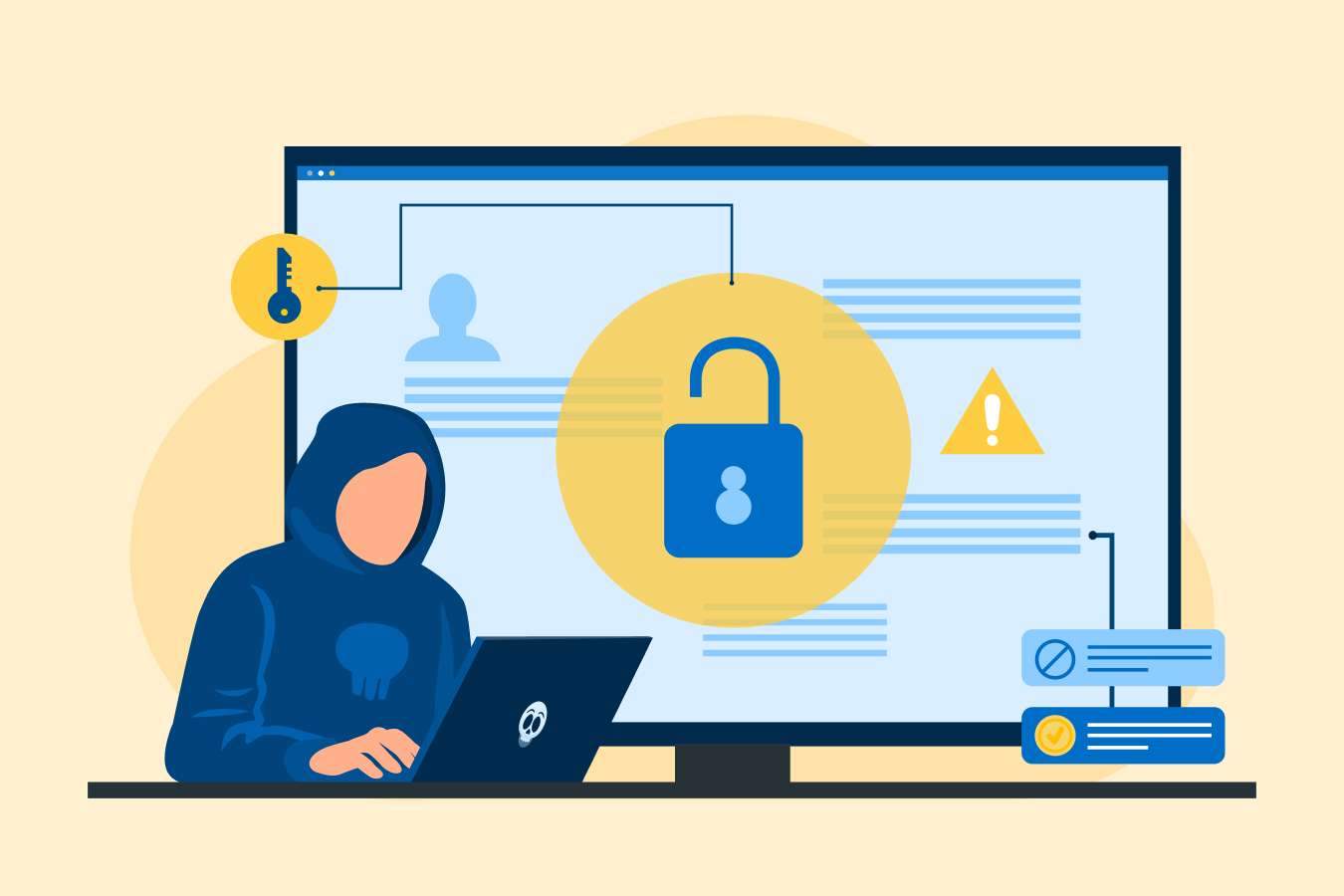Ethical Hacking vs Cyber Security: A Brief Comparison
Did you know that globally 30,000 websites are hacked daily, and 64% of companies worldwide have experienced at least one form of cyber attack?
Imagine waking up one morning to find that your entire digital life has been compromised, your bank account has been emptied, you have been locked out of your social media accounts, and your personal information has been leaked online. This nightmare is known as hacking, and it is becoming increasingly common in today’s world. To solve this problem, cybersecurity and ethical hacking were implemented.
Ethical hacking and cybersecurity have grown rapidly in recent years as more and more people rely on technology to manage their lives. As a result, ethical hackers are in high demand. So, let’s understand what is ethical hacking and cybersecurity, the difference between cybersecurity and ethical hacking, the future of the field, and more.
What is Cyber Security?
Cybersecurity is the practice of protecting devices, systems, networks, and sensitive information from unauthorized access, damage, or disruption. It includes a range of strategies, technologies, and practices that aim to safeguard digital assets and ensure data confidentiality, integrity, and availability.
With the rapid reliance on technology and increasing cyber threats, cybersecurity has become a critical concern for individuals, businesses, and the government. Cybersecurity professionals work to identify and detect potential risks and vulnerabilities, develop and implement security measures, and respond to security incidents and breaches. A study has also predicted that the global cybersecurity market is expected to grow by 15% each year from 2021 to 2025.
What is Ethical Hacking?
Ethical hacking or white-hat hacking involves the use of penetration testing tools, techniques, and methodologies to identify potential vulnerabilities in computer systems, networks, and applications.
The objective of ethical hacking is to simulate the techniques of malicious hackers in a controlled environment to assess and improve the overall security posture of an organization’s digital assets. This process involves a comprehensive assessment of all digital assets, identifying weaknesses, and reporting the findings to the organization.
The ultimate goal is to provide an organization with insights into its security posture and identify potential attack vectors that could be exploited by malicious hackers. You can learn more about ethical hacking through this in-depth ethical hacking course. Now that we have understood what ethical hacking and cybersecurity are, let us learn about cybersecurity vs ethical hacking and how they differ from each other.
Difference between Ethical Hacking and Cyber Security
Let’s understand the differences between cyber security and ethical hacking, to know how the two are different from each other.
| Parameters | Cybersecurity | Ethical Hacking |
| Definition | It refers to the protection of electronic systems, devices, networks, and data from unauthorized access or disruption. | It refers to the practice of using the same techniques and tools as malicious hackers to identify vulnerabilities. |
| Aim | It uses various techniques and tools to safeguard digital assets. | It uses techniques, such as penetration testing, to simulate attacks and identify vulnerabilities. |
| Focus | It focuses on preventing cyber attacks and minimizing damage. | It focuses on identifying potential security weaknesses and fixing them before exploitation. |
| Techniques | It includes techniques such as network security, application security, cloud security, and incident response. | It includes techniques such as penetration testing and vulnerability scanning to identify security weaknesses. |
| Work | Professionals identify vulnerabilities, implement security measures, and respond to security incidents. | Ethical hackers test the security of systems and provide recommendations for safeguarding the networks. |


Ethical Hacker Vs Cyber Security Analyst
Ethical hacking involves authorized hackery performed by certified ‘ethical’ hackers who are granted permission to execute hacking activity and hand in a report of their discoveries. Cyber security analysts, conversely, are proficient people with the specialized task of shielding systems from malicious activities.
Role of Cyber Security Analysts
- The primary task is to conduct periodic reviews and pinpoint flaws in the system.
- They must deploy advanced technologies for better security protection.
- It is important for a cyber security analyst to periodically maintain the cyber defense infrastructure, keeping it up-to-date at all times.
- They are responsible for enforcing access restrictions that safeguard sensitive information from unwarranted intrusions or illicit user activities. They are also responsible for alerting stakeholders about potential threats associated with malicious invasions on their networks.
Role of Ethical Hackers
- An ethical hacker’s role is to inspect the performance of a system by testing it for any security vulnerabilities.
- They are also responsible for conducting regular pen tests on the company’s systems, web applications, and networks. This is done in order to identify potential threats or weak points that can be exploited by hackers.
- Once these weaknesses have been discovered, they must report their findings back to the organization. They must also provide feedback regarding how such an attack might impact operations and/or users and then provide recommendations about how these issues could be addressed effectively within existing resources available at hand.
- Lastly, once solutions for identified flaws have been provided, they should re-test again until all concerns are alleviated satisfactorily.
Future of Cybersecurity and Ethical Hacking
- The future of cybersecurity and ethical hacking is an ever-evolving landscape, with new threats and challenges emerging constantly. With the increasing reliance on technology and the internet, cybersecurity threats are becoming more sophisticated and complex, and professionals in this field are continuously adapting and developing new strategies to keep up with these threats.
- The continued development of new technologies, such as artificial intelligence and the Internet of Things, is also creating new security risks that will require innovative solutions.
- Another trend is the increasing need for skilled professionals in this field. As the number of cyber threats increases, so does the demand for talented individuals who can identify and respond to these threats. Cybersecurity professionals who specialize in areas such as ethical hacking, network security, and risk management are likely to be in high demand in the coming years.
- Cyber threats are often global in nature and require cooperation between governments, organizations, and individuals to effectively address them. Professionals in this field will need to work together to develop new strategies and technologies that can keep up with the constantly evolving threat landscape.
Also Read: Cyber Security Skills
Conclusion
The future of cybersecurity is very promising. One of the biggest trends in the future of cybersecurity is the move toward automation and artificial intelligence. As cyber threats become more complex, the use of automated tools to identify and respond to these threats is becoming increasingly important.
Artificial intelligence can help organizations detect and respond to threats in real-time, and can also help identify vulnerabilities and suggest ways to mitigate them.







